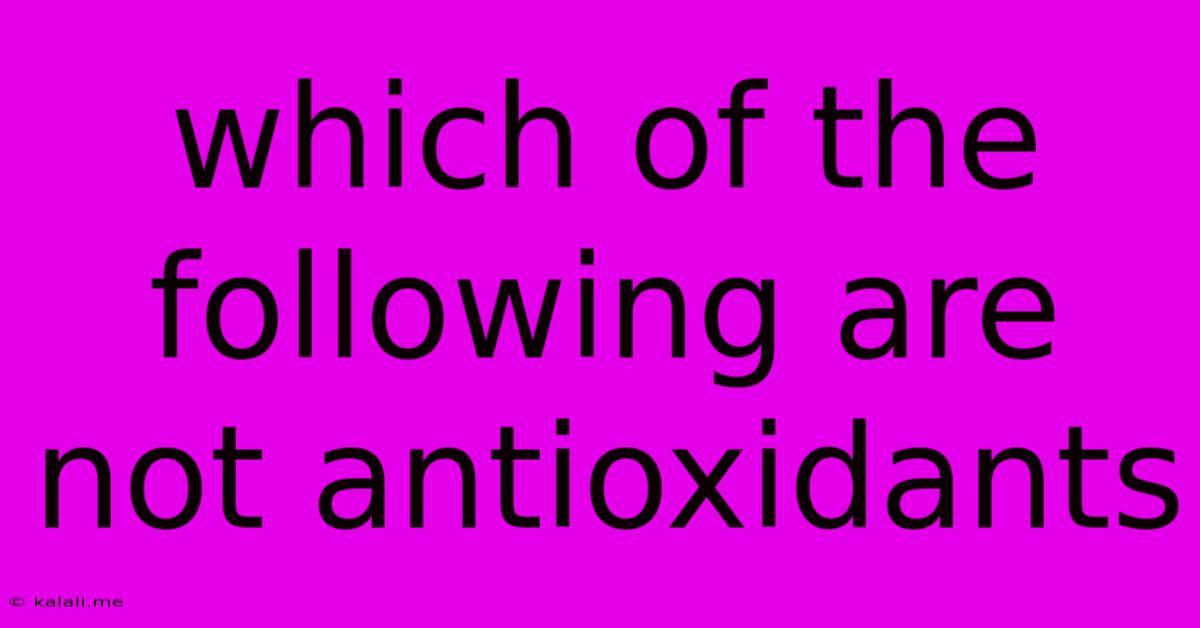Which Of The Following Are Not Antioxidants
Kalali
Jun 15, 2025 · 3 min read

Table of Contents
Which of the following are NOT Antioxidants? Understanding Antioxidant Properties
Antioxidants are substances that can prevent or slow damage to cells caused by free radicals, unstable molecules that can harm cells and contribute to aging and various diseases. Understanding what isn't an antioxidant is just as important as knowing what is. This article will explore several common substances and determine whether they possess antioxidant properties. We'll also delve into the mechanisms behind antioxidant action.
What are Free Radicals and Why are Antioxidants Important?
Before we identify non-antioxidant substances, let's briefly review the role of free radicals. Free radicals are molecules with an unpaired electron, making them highly reactive. This reactivity can damage cellular components like DNA, proteins, and lipids, potentially leading to oxidative stress and contributing to chronic diseases like cancer, heart disease, and Alzheimer's disease. Antioxidants neutralize these free radicals, protecting cells from damage. They achieve this by donating an electron to stabilize the free radical without becoming a free radical themselves.
Substances That Are NOT Antioxidants (or Have Limited Antioxidant Effects):
It's important to preface this section by saying that the antioxidant capacity of a substance can depend on various factors including concentration, the type of free radical involved, and the specific assay used to measure antioxidant activity.
-
Saturated Fats: While some fats offer health benefits, saturated fats generally lack antioxidant properties. They are more likely to contribute to oxidative stress themselves, although this is a complex area of research. Focus on unsaturated fats (monounsaturated and polyunsaturated) for their health benefits, including certain antioxidants found in some plant oils.
-
Simple Sugars (e.g., sucrose, glucose, fructose): These sugars are primarily energy sources and do not possess significant antioxidant capabilities. In fact, high sugar intake can contribute to oxidative stress indirectly by increasing inflammation and promoting the formation of advanced glycation end products (AGEs), which are implicated in cellular damage.
-
Trans Fats: Trans fats are known for their negative impact on cardiovascular health. They do not offer antioxidant benefits and are actively harmful.
-
Processed Meats: The processing of meats often involves methods that can reduce or eliminate any natural antioxidants present. Additionally, they can contribute to oxidative stress through other mechanisms.
-
Many Refined Grains: While whole grains contain some antioxidants, the refining process removes much of the bran and germ, which are the richest sources of these beneficial compounds.
Understanding the Nuances:
It’s crucial to avoid making oversimplified statements. Some substances may exhibit weak or context-dependent antioxidant properties. For instance, certain amino acids might act as antioxidants under specific conditions, but their primary function isn’t antioxidant activity. The focus should be on consuming a balanced diet rich in proven antioxidants.
Key Antioxidant-Rich Foods:
To contrast, here are some well-established sources of antioxidants:
-
Fruits and Vegetables: Berries (blueberries, strawberries, raspberries), dark leafy greens (spinach, kale), and colorful vegetables (carrots, bell peppers) are excellent sources of various antioxidants like vitamins C and E, carotenoids, and polyphenols.
-
Nuts and Seeds: Almonds, walnuts, chia seeds, and flaxseeds contain vitamin E and other antioxidant compounds.
-
Legumes: Beans and lentils provide various antioxidants and fiber.
Conclusion:
While many substances are touted for their health benefits, it's vital to understand that not all of them are antioxidants. A balanced diet rich in fruits, vegetables, nuts, seeds, and legumes provides a wide array of antioxidants, contributing to overall health and well-being. Focus on whole, unprocessed foods for optimal antioxidant intake and remember to consult with healthcare professionals for personalized advice.
Latest Posts
Latest Posts
-
Which Of The Following Vitamins Is Not Fat Soluble
Jun 16, 2025
-
A Community Of Interdependent Organisms And Their Physical Environment
Jun 16, 2025
-
Anything That Has Mass And Occupies Space Is Defined As
Jun 16, 2025
-
What Is The Lcm Of 4 6 And 10
Jun 16, 2025
-
What Is The Prime Factorization Of 95
Jun 16, 2025
Related Post
Thank you for visiting our website which covers about Which Of The Following Are Not Antioxidants . We hope the information provided has been useful to you. Feel free to contact us if you have any questions or need further assistance. See you next time and don't miss to bookmark.